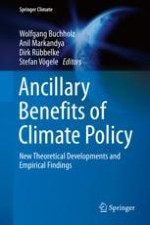2020 | OriginalPaper | Buchkapitel
Impure Public Good Models as a Tool to Analyze the Provision of Ancillary and Primary Benefits
verfasst von : Anja Brumme, Wolfgang Buchholz, Dirk Rübbelke
Erschienen in: Ancillary Benefits of Climate Policy
Aktivieren Sie unsere intelligente Suche, um passende Fachinhalte oder Patente zu finden.
Wählen Sie Textabschnitte aus um mit Künstlicher Intelligenz passenden Patente zu finden. powered by
Markieren Sie Textabschnitte, um KI-gestützt weitere passende Inhalte zu finden. powered by
